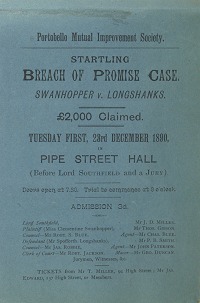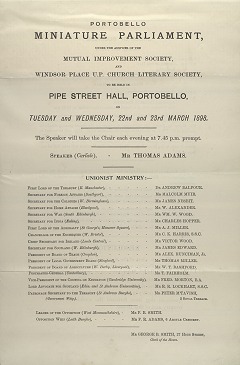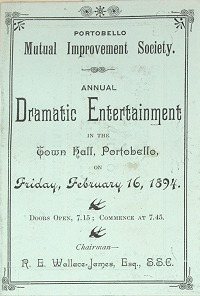Contents ![]() | Institutes of learning
| Institutes of learning ![]() | Sources
| Sources ![]()

Mutual Improvement Societies
Page 2 of 2 | Previous
Organisations with the above purpose or similar names were once everywhere. They took the literary society one stage forward by focussing on learning debating skills and improving their own knowledge and skills. Portobello will serve as an example of the activity in this area.
In Portobello there were probably two mutual improvement societies - the West End Mutual Improvement Society and the Portobello Mutual Improvement Society. Both originated around 1883. The latter was for men only although women were allowed to attend some of the social events. The aim of the Society was 'the moral and intellectual improvement of the members and the promotion of social intercourse between them'. The society associated actively with other similar organisations, went on outings to sites of interest, and presented dramatic entertainment.

The Portobello West End Mutual Improvement Society was established in 1883, the president being a Mr Brand. 'All working men were encouraged to join the society which was formed for the purpose of mutual improvement'. There is an advertisement in the Portobello Advertiser dating to January 3rd 1885 that mentions a meeting will be held in Pipe Street Hall. Advertisements for the Society appear until 1887 but no later. After this the society amalgamated with another: the Portobello Mutual Improvement Society. JD Miller was the founding president, also in 1883.
According to Mr Blue, president of the combined society in 1902, one of the advantages gained by membership was the formation of friendships, which in his case were 'the happiest in his life'. The main activities included 'the giving of essays, debates, and other matters of a similar character with their invaluable accompaniment - criticism'.

The members took part in mock council elections with some members standing as councillors and putting their points across and the other members voting for the one they felt was best. They joined with other mutual improvement societies to run miniature parliaments when they took on the role of Members of Parliament and discussed topics that were being debated in the House of Commons. As well as developing their speaking skills, activities such as these must have increased their knowledge of how a democracy operated - an important factor when the franchise had widened and the growth of mass action political parties required able and articulate activists. Debates between the members had titles such as 'Should the means of production be nationalised' or 'Should the hours of labour be regulated'?
Members wrote poetry and articles that were read (anonymously) aloud to the other members, who than gave their opinion: 'a sonnet was submitted which came in for unqualified disapproval, as being senseless, timeless and altogether bad. The rules of the society prevented the editor from explaining until the learned criticism was expended - that the sonnet was Shakespeare's'.
As late as 1907 activities organised by the Portobello Mutual Improvement Society were still being advertised. Lectures on subjects as diverse as astronomy, the Royal Mile, old age pensions and the nationalisation of the railways were offered to the members.
Page 2 of 2 | Previous
In this section:
Women's Co-operative Guilds | Scottish Women's Rural Institute | Literary and debating societies
Contents ![]() | Institutes of learning
| Institutes of learning ![]() | Sources
| Sources ![]()